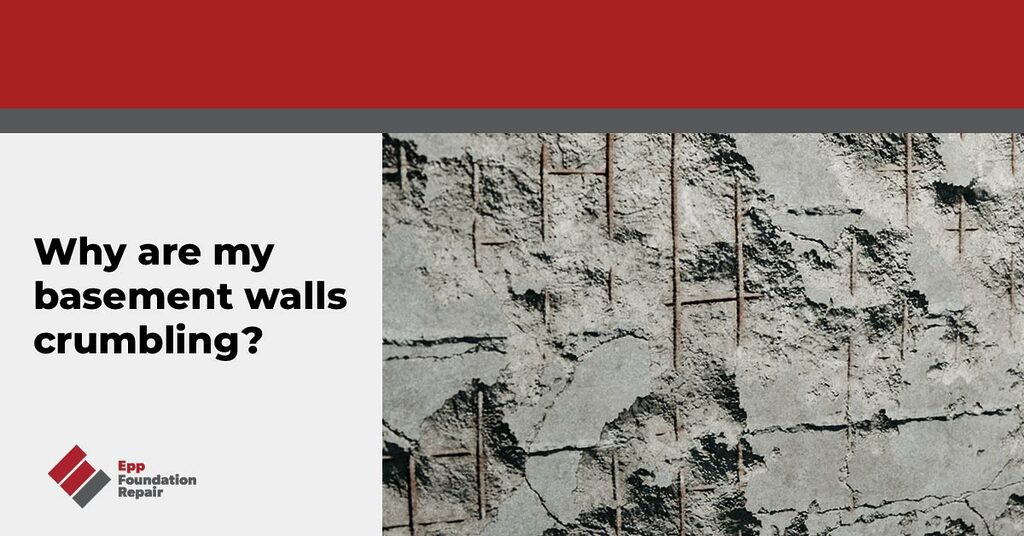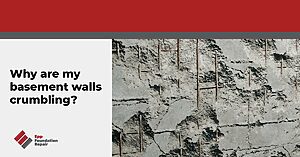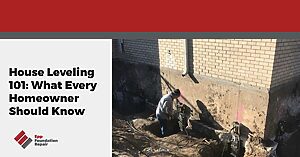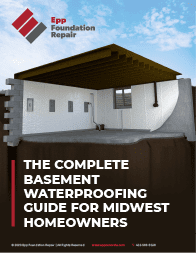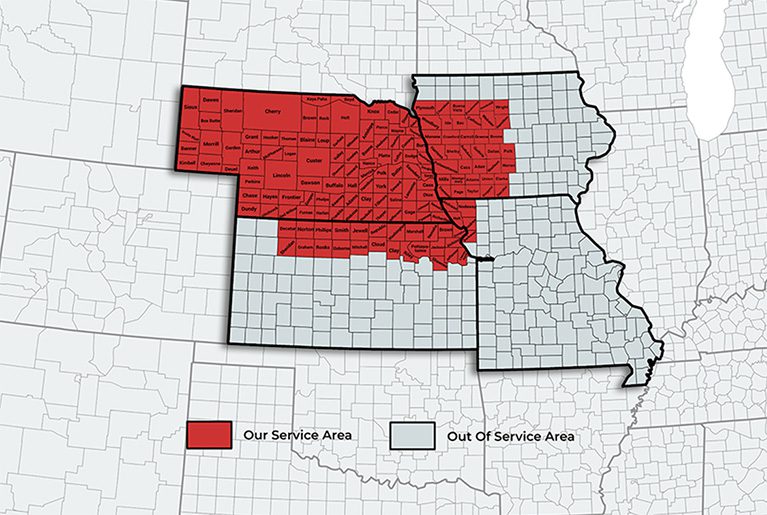If your basement wall is crumbling, you likely have an advanced case of spalling caused by drainage issues, freezing and thawing cycles, minerals in your concrete, or improper building techniques. In extreme cases, your basement may crumble because of uneven foundation settling. In this article, you will learn more about concrete spalling, how to tell if your basement walls are crumbling, why your basement walls are crumbling, how to prevent spalling, and how to fix your crumbling concrete.
What Is Concrete Spalling?
Concrete spalling, or scaling, is when concrete begins to degrade. Spalling will cause your concrete to form pits, flakes, and cracks. In more severe cases, the concrete will start to crumble and break away, threatening the structural integrity of your home.
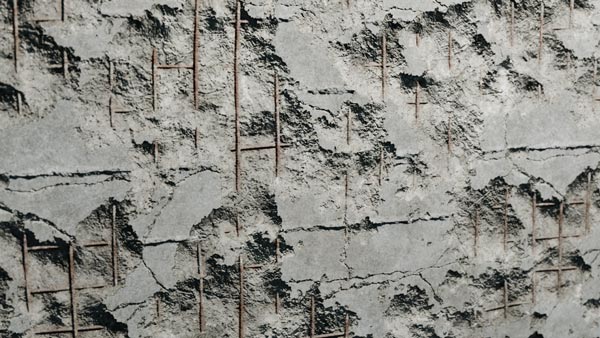
What Are the Signs That My Basement Wall Is Crumbling?
Before your basement wall begins to crumble, you might notice these preliminary signs:
- Efflorescence: This is a white staining that appears on the surface of your concrete. When water penetrates the concrete, it mixes with the naturally occurring salt in your concrete and dissolves it. When the water evaporates, it brings the salt solution to the surface, crystalizing and creating that white appearance. If the efflorescence keeps returning after multiple attempts to clean it, this is a sign that you are having water issues in your basement and the start of more problems ahead.
- Hairline Cracks, Chipping, and Flaking: Before your basement walls crumble, you might find a web of hairline cracks followed by the chipping and flaking of the concrete. These are signs of the advancement of the issues affecting your basement foundation.
Why Are My Basement Walls Crumbling?
Here are five reasons why your basement walls might be crumbling:
- Drainage Issues:
Crumbling concrete is usually caused by water penetrating the concrete and weakening it. Suppose the soil surrounding your basement holds excessive water. In that case, it will compromise your basement’s integrity by eroding the concrete, corroding the rebar within the walls, causing the concrete to spall, and even forcing the walls inward. - Freezing and Thawing:
When water penetrates the basement’s concrete walls and freezes, it causes the concrete to expand, putting pressure on it. When the ice thaws, the concrete contracts. This cycle weakens the concrete and may eventually cause your basement walls to crumble. - Minerals in Your Concrete:
Age is another factor to consider if your basement walls are crumbling. Older basements were built with concrete mixes higher in pyrite, silica, and mica. When these minerals oxidize, they can leach out of the concrete and cause your basement to crack or crumble. - Improper Building Techniques:
If the concrete used to construct your basement was improperly mixed, meaning the builder used too much or too little water, or the cement was low quality, your basement walls will likely crumble. Another problem could be related to improper curing or finishing of the concrete. Although these issues are far less likely than those related to water damage, they exist and warrant investigation should you rule out soil oversaturation and age. - Differential Settlement
In cases of differential settlement, when part of your home sinks into the ground faster than the rest, your basement walls could crack and eventually crumble. Uneven settling may happen because of soil erosion, soil oversaturation, poor site preparation, and natural disasters, to name a few.
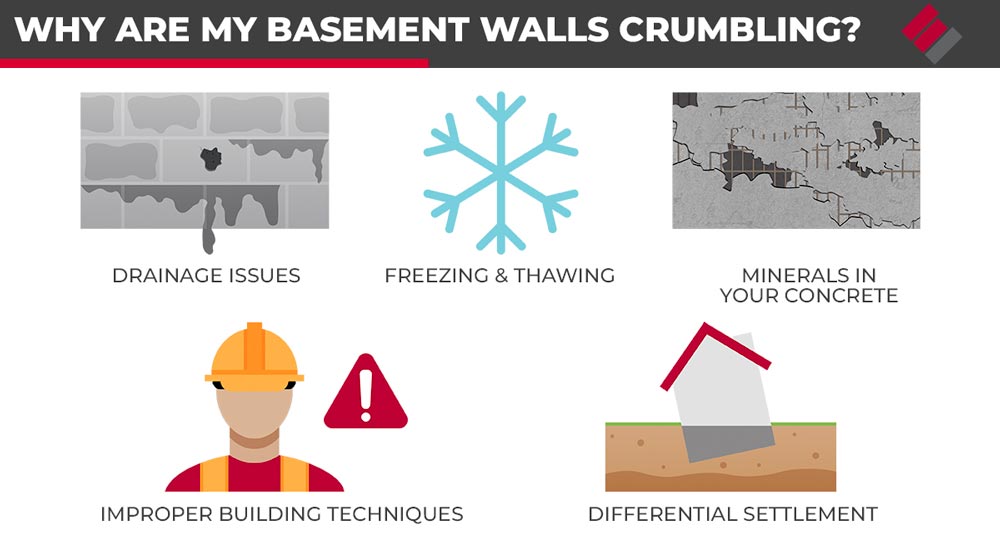
How Can I Prevent My Basement Walls from Crumbling?
The best way to prevent your basement walls from crumbling is to keep water away from your foundation. Here are a few ways you can do that:
- Clean your gutters regularly.
When your gutters are full of debris, water can overflow and fall right along the side of the home. This water soaks into the soil near your basement, causing excessive water buildup near your basement. - Install downspout extensions.
This will help rainwater to flow far away from your home’s basement. - Avoid sprinklers and landscaping that require excessive watering near the home.
Remember, your goal is to keep the soil around your home dry. You can achieve that goal by avoiding sprinklers near your home or plants requiring frequent watering. - Regrade your yard.
To avoid water pooling around your home, especially in areas prone to heavy rainfall and flooding, consider regrading your yard so that water flows away from your home. - Install a drain tile system.
Internal and external drain tile systems are waterproofing solutions designed to prevent water buildup in the soil around your home by channeling the water away from the foundation.
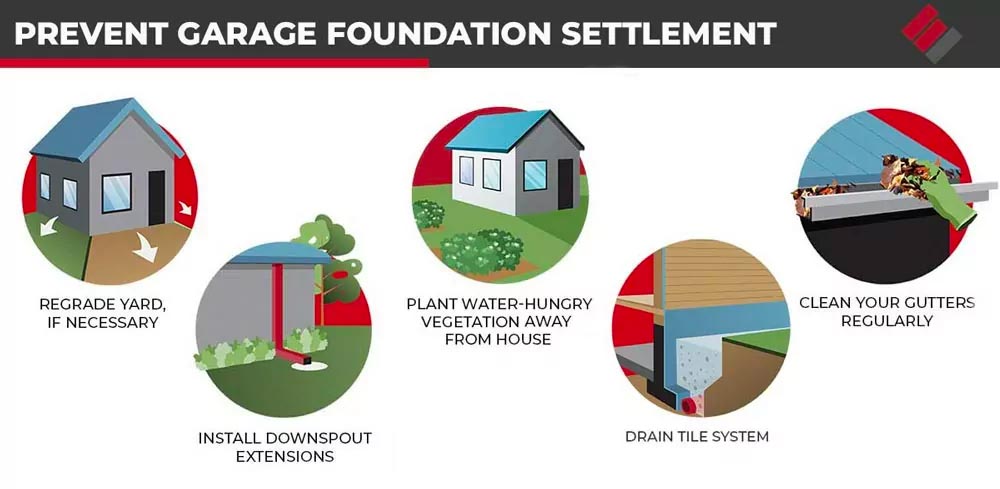
If you want to learn more about waterproofing your basement, check out this article: How to Keep Old Basement Dry
How Can I Fix My Crumbling Basement Walls?
The four most popular repair methods for crumbling basement walls include:
- Concrete Overlays
This involves applying a thin layer of concrete over the affected area. Although popular, this repair is only cosmetic and must be repeated. - Topical Sealers
These create a barrier for your basement wall, protecting it from water and other materials. However, it does not deeply penetrate the concrete, so it will not stop the spalling. - Penetrating Sealers
Penetrating sealers can slow spalling since they help seal and reinforce the concrete. However, this is still not a permanent solution. - Concrete Replacement
Although more intensive, replacing the affected concrete with freshly poured concrete will provide the most long-lasting solution.
If your basement is crumbling because of differential settlement, you will need to stabilize your foundation before attempting to repair the crumbling walls. An expert may recommend using push or helical piers to stabilize your home.
Before repairing your crumbling basement wall and deciding which repair method to use, you must understand and resolve the underlying issue. Otherwise, your repair will prove useless.
The best thing you can do is speak to a foundation repair expert. Not only will they find the source of the problem, but they can provide cost-effective and lasting solutions. Contact us today to schedule an evaluation and repair estimate for your basement. We service customers in Nebraska, Iowa, Kansas, and Missouri.

